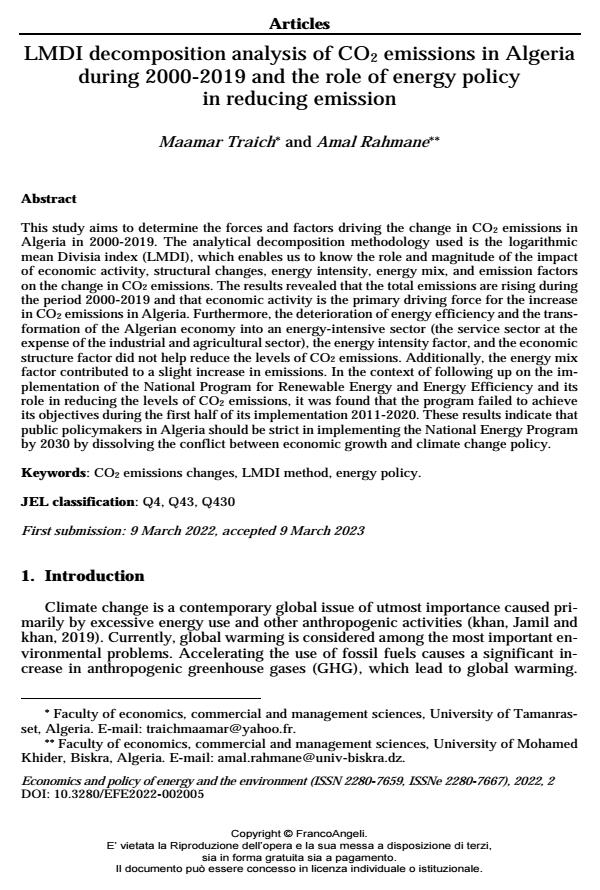LMDI decomposition analysis of CO2 emissions in Algeria during 2000-2019 and the role of energy policy in reducing emission
Journal title ECONOMICS AND POLICY OF ENERGY AND THE ENVIRONMENT
Author/s Maamar Traich, Amal Rahmane
Publishing Year 2023 Issue 2022/2
Language English Pages 24 P. 83-106 File size 525 KB
DOI 10.3280/EFE2022-002005
DOI is like a bar code for intellectual property: to have more infomation
click here
Below, you can see the article first page
If you want to buy this article in PDF format, you can do it, following the instructions to buy download credits

FrancoAngeli is member of Publishers International Linking Association, Inc (PILA), a not-for-profit association which run the CrossRef service enabling links to and from online scholarly content.
This study aims to determine the forces and factors driving the change in CO2 emissions in Algeria in 2000-2019. The analytical decomposition methodology used is the logarithmic mean Divisia index (LMDI), which enables us to know the role and magnitude of the impact of economic activity, structural changes, energy intensity, energy mix, and emission factors on the change in CO2 emissions. The results revealed that the total emissions are rising during the period 2000-2019 and that economic activity is the primary driving force for the increase in CO2 emissions in Algeria. Furthermore, the deterioration of energy efficiency and the trans- formation of the Algerian economy into an energy-intensive sector (the service sector at the expense of the industrial and agricultural sector), the energy intensity factor, and the economic structure factor did not help reduce the levels of CO2 emissions. Additionally, the energy mix factor contributed to a slight increase in emissions. In the context of following up on the im- plementation of the National Program for Renewable Energy and Energy Efficiency and its role in reducing the levels of CO2 emissions, it was found that the program failed to achieve its objectives during the first half of its implementation 2011-2020. These results indicate that public policymakers in Algeria should be strict in implementing the National Energy Program by 2030 by dissolving the conflict between economic growth and climate change policy
Keywords: CO2 emissions changes, LMDI method, energy policy
Jel codes: Q4, Q43, Q430
- The non-energy industrial sector: an analysis of Algeria's energy-related CO2 emissions (2006-2021) Sarra Robei, Noureddine Settou, in STUDIES IN ENGINEERING AND EXACT SCIENCES /2024 pp.e11735
DOI: 10.54021/seesv5n2-671 - Financial levers and carbon emissions: analysing the debt-emission nexus in the European Union Cristian Stanciu, Narcis Eduard Mitu, in Applied Economics /2025 pp.7889
DOI: 10.1080/00036846.2024.2393901
Maamar Traich, Amal Rahmane, LMDI decomposition analysis of CO2 emissions in Algeria during 2000-2019 and the role of energy policy in reducing emission in "ECONOMICS AND POLICY OF ENERGY AND THE ENVIRONMENT" 2/2022, pp 83-106, DOI: 10.3280/EFE2022-002005